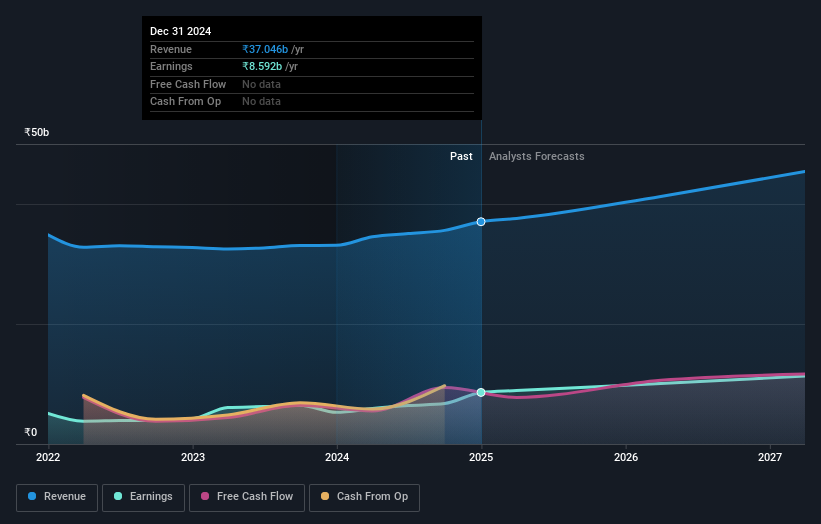GlaxoSmithKline Pharmaceuticals Limited's (NSE:GLAXO) last week's 11% decline must have disappointed public companies who have a significant stake

Key Insights
- The considerable ownership by public companies in GlaxoSmithKline Pharmaceuticals indicates that they collectively have a greater say in management and business strategy
- The largest shareholder of the company is GSK plc with a 75% stake
- Using data from analyst forecasts alongside ownership research, one can better assess the future performance of a company
A look at the shareholders of GlaxoSmithKline Pharmaceuticals Limited (NSE:GLAXO) can tell us which group is most powerful. The group holding the most number of shares in the company, around 75% to be precise, is public companies. In other words, the group stands to gain the most (or lose the most) from their investment into the company.
As market cap fell to ₹437b last week, public companies would have faced the highest losses than any other shareholder groups of the company.
Let's take a closer look to see what the different types of shareholders can tell us about GlaxoSmithKline Pharmaceuticals.
Check out our latest analysis for GlaxoSmithKline Pharmaceuticals

What Does The Institutional Ownership Tell Us About GlaxoSmithKline Pharmaceuticals?
Institutional investors commonly compare their own returns to the returns of a commonly followed index. So they generally do consider buying larger companies that are included in the relevant benchmark index.
We can see that GlaxoSmithKline Pharmaceuticals does have institutional investors; and they hold a good portion of the company's stock. This can indicate that the company has a certain degree of credibility in the investment community. However, it is best to be wary of relying on the supposed validation that comes with institutional investors. They too, get it wrong sometimes. If multiple institutions change their view on a stock at the same time, you could see the share price drop fast. It's therefore worth looking at GlaxoSmithKline Pharmaceuticals' earnings history below. Of course, the future is what really matters.

Hedge funds don't have many shares in GlaxoSmithKline Pharmaceuticals. GSK plc is currently the largest shareholder, with 75% of shares outstanding. This implies that they have majority interest control of the future of the company. The second and third largest shareholders are ICICI Prudential Asset Management Company Limited and Life Insurance Corporation of India, Asset Management Arm, with an equal amount of shares to their name at 1.3%.
While it makes sense to study institutional ownership data for a company, it also makes sense to study analyst sentiments to know which way the wind is blowing. There are plenty of analysts covering the stock, so it might be worth seeing what they are forecasting, too.
Insider Ownership Of GlaxoSmithKline Pharmaceuticals
The definition of company insiders can be subjective and does vary between jurisdictions. Our data reflects individual insiders, capturing board members at the very least. The company management answer to the board and the latter should represent the interests of shareholders. Notably, sometimes top-level managers are on the board themselves.
Most consider insider ownership a positive because it can indicate the board is well aligned with other shareholders. However, on some occasions too much power is concentrated within this group.
Our data cannot confirm that board members are holding shares personally. Given we are not picking up on insider ownership, we may have missing data. Therefore, it would be interesting to assess the CEO compensation and tenure, here.
General Public Ownership
The general public, who are usually individual investors, hold a 18% stake in GlaxoSmithKline Pharmaceuticals. This size of ownership, while considerable, may not be enough to change company policy if the decision is not in sync with other large shareholders.
Public Company Ownership
Public companies currently own 75% of GlaxoSmithKline Pharmaceuticals stock. It's hard to say for sure but this suggests they have entwined business interests. This might be a strategic stake, so it's worth watching this space for changes in ownership.
Next Steps:
While it is well worth considering the different groups that own a company, there are other factors that are even more important. For instance, we've identified 1 warning sign for GlaxoSmithKline Pharmaceuticals that you should be aware of.
If you are like me, you may want to think about whether this company will grow or shrink. Luckily, you can check this free report showing analyst forecasts for its future .
NB: Figures in this article are calculated using data from the last twelve months, which refer to the 12-month period ending on the last date of the month the financial statement is dated. This may not be consistent with full year annual report figures.
New: Manage All Your Stock Portfolios in One Place
We've created the ultimate portfolio companion for stock investors, and it's free.
• Connect an unlimited number of Portfolios and see your total in one currency
• Be alerted to new Warning Signs or Risks via email or mobile
• Track the Fair Value of your stocks
Have feedback on this article? Concerned about the content? Get in touch with us directly. Alternatively, email editorial-team (at) simplywallst.com.
This article by Simply Wall St is general in nature. We provide commentary based on historical data and analyst forecasts only using an unbiased methodology and our articles are not intended to be financial advice. It does not constitute a recommendation to buy or sell any stock, and does not take account of your objectives, or your financial situation. We aim to bring you long-term focused analysis driven by fundamental data. Note that our analysis may not factor in the latest price-sensitive company announcements or qualitative material. Simply Wall St has no position in any stocks mentioned.
About NSEI:GLAXO
GlaxoSmithKline Pharmaceuticals
Manufactures, distributes, and trades in pharmaceuticals in India and internationally.
Outstanding track record with flawless balance sheet and pays a dividend.
Similar Companies
Market Insights
Community Narratives



